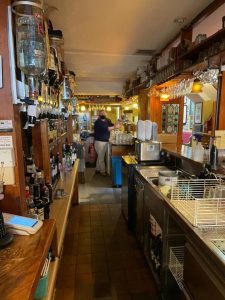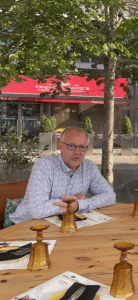The staffing crisis in the licensed trade

In a recent Licensed Vintners Association survey, 89% of its members reported having vacancies for chefs, averaging out overall at three kitchen staff vacancies per premises.
Even my own local WhatsApp forum recently ran a heartfelt plea from a hospitality proprietor: “Any sons or daughters looking for a casual job 20/30 hrs a week for August and shorter hrs in September in catering please contact me”.
The LVA survey also found that 74% of its members found recruiting chefs ‘very difficult’ with 21% finding it ‘difficult’. That’s 19 out of 20 who’re finding chef recruitment difficult or very difficult.
As the LVA points out, “The huge competition for kitchen staff – and chefs in particular – is obviously leading to a knock-on impact of higher staff costs”.
As a result of the staffing shortage, pubs, hotels and restaurants around the country report having to restrict their services, with some conducting business at just 60% of capacity as they simply lack the staff to run an operation where Social Distancing coupled with Track & Trace requirements don’t already restrict capacity.
Said operations now require extra staffing to adhere to the onerous new obligations brought about by the current ‘Covid Passport’ and registration restrictions.
This requires people to be put front-of-house to deal with the additional ‘paperwork’ required.
Indeed, staffing is currently the single biggest issue facing the licensed trade.
Reasons why
During Lockdown, many trained workers left a moribund hospitality industry for the brighter pastures of (sometimes better-paid) job security elsewhere.
Other former staff – mostly Summer jobbing students – found the Pandemic Unemployment Payment just too good to relinquish.
PUP’s overall bill currently stands at over €8.3 billion while some 30,346 hospitality workers – the highest sector of the economy in receipt of the PUP – still remain on the PUP’s books at the time of going to press, followed by the Wholesale and Retail Trade (23,762) and Administrative and support service activities (17,518).
Students receiving the PUP who’d advised the Department of Social Protection that they are or will be full-time students in the upcoming 2021/2022 academic year received their final payment on Tuesday the 7th of September.
Hopefully students on the PUP will return to work as they return to studies this month, for in line with the government’s National Economic Recovery Plan, the PUP will be gradually reduced on a tapered basis over a six-month period until February 2022 to align it with the standard jobseekers’ payments.
Jerry Behan, the Horshoe, Listowel

“We’re currently dealing with an agency over in India to try to get in chefs,” says Jerry Behan.
At the moment Jerry Behan, proprietor of the Horseshoe Bar & Restaurant in Listowel, County Kerry, cannot offer inside dining even ‘though legislation allows it. He simply hasn’t got the staff.
“I’ve put ads in the local papers but we’re not even getting replies,” he says.
Apart from chefs, he needs waiters, waitresses and kitchen porters.
He too firmly believes that much of this shortage is down to the PUP.
“Guaranteed” he agrees, “When people are getting money for sitting at home why should they work?
“I’ve waitresses here, part-timers, who were getting 15 to 20 hours a week now getting €350 for sitting at home,” he says, “It’s not encouraging people to go out and look for jobs. When the PUP is done away with, people will come out looking for work again.”
Jerry believes that a lot of chefs have transferred into retail because, “.. they’re finished at four o’clock and there’s no weekend work”.
In hospitality operations like his, ‘chefing’ in the kitchen is an all-year-round seven-days-a-week vocation.
Jerry’s own story emphasises the seriousness of the current situation.
“We’re currently dealing with an agency over in India to try to get in chefs,” he says, “That’s going to cost us as we’ve to pay for flights and accommodation for a month until they find their feet – and visas, putting an extra cost on Hospitality.
“It’s sad when you have to go to India to bring in chefs.”
Jerry’s reviewing 29 CVs from such chefs and hopes to bring in two extra chefs to cover for staff taking leave if nothing more.
“We may have to close for two weeks in September to give our staff some holidays – and the danger is that if you close down you might not open again as customers drift elsewhere,” he explains, “But we’re all in the same boat in hospitality to try and catch up with holiday rostering etc.”
Jerry feels that the government should be more hands-on.
“The hospitality trade is in dire straits,” he says, “The experiences we’re going through like hiring abroad…. something should be done by the government on this when we can’t get Irish chefs; there should be some incentive there for Irish chefs.”
Staff burnout
Jerry himself pulls an 80-hour week at present.
“I’m in every morning at seven or eight o’clock and I’m still there at eight to 10pm seven days a week,” he says, “I have to be there as we haven’t the staff to do it any other way. And some of the staff I do have need to be given training too…”
Sean McCarthy

“The mindset of our industry needs to change and change quickly if we want to retain our key staff members” – Sean McCarthy.
In Cork, Sean McCarthy runs four outlets in SoHo Bar & Restaurant, Paddy the Farmer’s Bar & Kitchen, East Village Bar, Restaurant & Hotel and Tequila Jacks Mexican Restaurant & Tequila Bar.
Like so many operations his group has had to restrict services due to the staffing crisis.
“We’re currently only operating five days per week and in all four of our premises our capacity has been reduced by almost 50%,” he points out.
Apart from a major chef shortage, the next critical area is middle and senior management, he adds.
For Sean the availability of the PUP is a major issue.
“It was a good initiative at the start when there were so many unknowns” he says, “but it really needs to be scaled back as soon as possible as it’s definitely preventing a minority from looking for work.”
And he agrees that the Hospitality sector has lost a lot of staff to other industries due to better conditions ie no night work Monday to Friday.
“Work-life balance for staff is very important since Covid 19, so the mindset of our industry needs to change and change quickly if we want to retain our key staff members,” he says.
“I’ve been in this industry for 20 years and honestly this is the worst I’ve ever seen. Employing and keeping good staff now is almost a full-time job.”
Hospitality Training courses with a recognised qualification are a “must” he believes, “especially in the ‘chefing’ area”.
At present, staff burnout is a reality.
“That’s another reason we’re only trading five days per week. Staff’s mental and physical health is very important to us in our business so by trading five days per week, all staff know they’ve at least two days off per week. This is working for us currently but our aim once staffed-up, is to be back open seven days per week.”
Agency recruitment

“I’ve talked to restaurant chefs now working in retail or in healthcare, restaurant front-of-house managers working in car sales and for the HSE in Contact Tracing and in vaccination centres,” say’s The Firm’s Micheline Corr.
Hospitality recruitment agencies like The Firm in Dublin report losing a tremendous amount of talent.
“By nature hospitality professionals are energetic, busy people,” Micheline Corr, Director at The Firm, tells Drinks Industry Ireland, “They thrive in the company of colleagues and customers. It has not suited these outgoing personalities to stay home endlessly waiting for reopening dates and so they’ve found other secure employment outside of hotels and restaurants.
“I’ve talked to restaurant chefs now working in retail or in healthcare, restaurant front-of-house managers working in car sales and for the HSE in Contact Tracing and in vaccination centres.
“Food retail businesses have focused in and provided steady jobs during this turbulent time. It might not pay the same but candidates are enjoying the change – and the daytime hours.
“I believe that when the PUP payments end some experienced bar, restaurant and kitchen staff will return from their home countries [and] have the confidence to work in our industry again but my fear is that this may not happen as quickly or in the numbers that are needed,” she warns.
“Where possible employers have reconnected with staff offering jobs and additional training in the new protocols and new systems; nobody had the perfect plan and HR Managers who had a full quota ready to return found themselves back in the hiring market in the weeks leading up to the reopenings.
“New ways of working include roster changes to help parents with childcare and it’s much more common now to include remote working for positions that were traditionally office-based.”
There can be little doubt that the staff shortage in the licensed trade is at a critical level.
As VFI Chief Executive Padraig Cribben pointed out recently, the extent of the demand for the PUP is “surprising” given the abundance of vacant positions around the country in hospitality – and he wondered about regional variations affecting pub workers.
As with the Horseshoe and Sean McCarthy’s group, Padraig pointed out that some publicans have even been forced to remain shut for the first few days of the week to ensure that they can get enough staff for the busier trading days later in the week.
“There’s little doubt that the staffing situation is at crisis point,” agrees LVA Chairman Noel Anderson who also operates The Bridge 1859 and Lemon & Duke in Dublin, “I myself am in the middle of all of it and as things stand I’m looking for three chefs between my two pubs. I could do with a number of kitchen porter staff also. There are a number of issues contributing to this between staff looking to go a different direction. The PUP is a controversial one as many late-night members are still closed and they need that support for their staff so they can’t have them when they get back. I totally disagree with anyone still claiming it when work is available to them.
“The government needs to fast-track visas for foreign skilled chefs,” he continued, “The chef situation is the worst I’ve ever seen it and it was shockingly bad before.
“The government needs to listen to how disastrous the situation is and work with the industry to provide short- medium- and long-term solutions as this will have lasting effects on hospitality and the customers experience if not soon rectified.”
The omens for the pub trade are clear.
#BeThePulse
To support industry recruitment Fáilte Ireland recently launched the #BeThePulse campaign. The campaign is currently running across radio, print and social media. In order to help industry leverage the campaign, Fáilte Ireland has developed an industry toolkit which includes free social media assets and top tips from recruitment experts. https://failteireland.ie/tourismcareers









